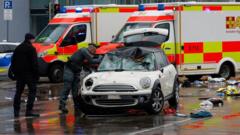At least 30 individuals were injured in a car-ramming incident in Munich on Thursday, just days before Germany’s crucial federal elections. The driver, identified as a 24-year-old Afghan asylum seeker named Farhad N., was apprehended at the scene, prompting an immediate investigation led by counter-terrorism officers due to suspicions of an extremist background.
The attack occurred during a rally organized by transport workers near Dachauer Strasse, close to Munich's central train station. Eyewitness accounts describe a chaotic scene where pedestrians scrambled for shelter as a car accelerated towards on-duty police vehicles before crashing into a crowd. Munich police quickly responded, firing at the vehicle before detaining the driver.
Rescue efforts were swift, with helicopters deployed to transport injured parties to hospitals, including several children among the casualties. Mayor Dieter Reiter characterized the incident as alarming, emphasizing the urgency for public safety.
Authorities are cautious as they investigate the attack, which occurs in the context of heightened security concerns in Germany following a series of violent incidents attributed to immigrants. Chancellor Olaf Scholz called for the driver to face penalties and noted the necessity for him to be expelled from the country.
The recent incident adds to a troubling trend regarding immigration and crime, particularly as the elections scheduled for February 23 see parties like the far-right Alternative for Germany (AfD) gaining traction. These developments come alongside previous attacks in the region, heightening tensions around immigration policy and public safety.
The Bavarian interior minister remarked on the need for change, reflecting broader societal unease in Germany. With opinion polls showing the AfD climbing in popularity, Scholz's government is reportedly planning to respond with stricter deportation measures targeting serious offenders, particularly those from Afghanistan.
With security and immigration policies now central themes in the election discourse, the Munich incident underscores the urgency for political action ahead of an anticipated shift in the German political landscape.




















